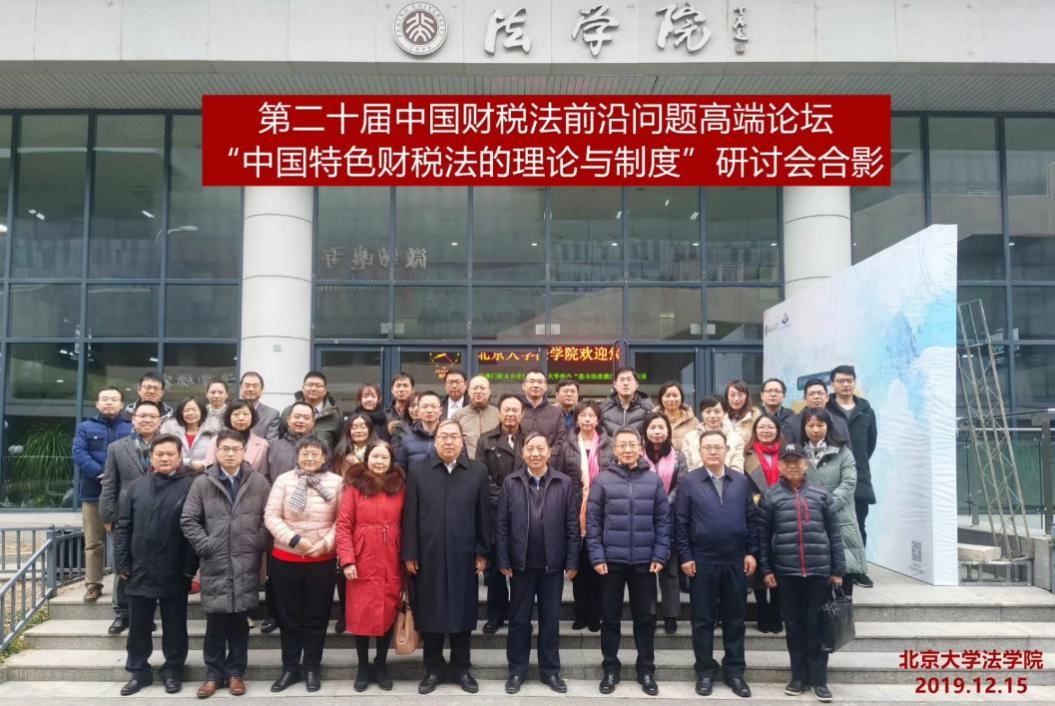The 20th Forum on Frontier Issues in China’s Fiscal and Tax Law was successfully Held
Date:2020-01-10

On December 15, 2019, the Forum on China’s Fiscal and Tax Law Frontiers, sponsored by the Taxation Law Society, hosted by PKULS, Peking University Financial Law Research Center, and co-organized by Beijing Mingshui Law Firm. The seminar on the theory and system of fiscal and tax law with Chinese characteristics was successfully held in Conference Room 307 in (Leo) Koguan Building. More than 60 financial and tax law experts and scholars and practitioners from Peking University, Tsinghua University, Renmin University of China, Shanghai Jiaotong University, Fudan University, Wuhan University, Xiamen University, University of Chinese Academy of Social Sciences, Central University of Finance and Economics, China University of Political Science and Law, South China University of Technology, Hebei University, East China University of Political Science and Law, Zhongnan Finance and Economics from the University of Political Science and Law, Southwest University of Political Science and Law, Northwest University of Political Science and Law, Liaoning University, the State Administration of Taxation and other practical departments, core journals and magazines such as China Social Science and Tsinghua Law . Xinhua News Agency, Legal Daily, China Tax News and other news media reported on the forum. This seminar focuses on the theory and system of fiscal and taxation law with Chinese characteristics, and aims to explore the institutional model with Chinese characteristics in order to advance theoretical research on fiscal and taxation law system to a new level.
The opening ceremony was presided over by Liu Jianwen, a professor at the School of Law of Peking University and the director of the Research Center for Financial Law of Peking University. Prof. Guo Li, Secretary of the Party Committee of PKULS, delivered an opening speech. Secretary Guo Li extended a warm welcome to the experts and scholars present at the meeting, and briefly introduced the development history and current situation of the PKULS. He said that looking forward to the future, I believe that with the joint efforts of experts and scholars, the development of fiscal and tax law research in 2020 is worth looking forward to.
During the keynote speech and discussion stage of the conference, the experts and scholars participating in the conference focused on “the domain law paradigm and new thinking in the new era of legal research”, “the content and system of the theory of fiscal and taxation law with Chinese characteristics”, “the basic system, basic system, and important system of national fiscal and taxation governance”. Key issues such as the comprehensive implementation of the legal principles of taxation and the formulation of general rules (or tax code) of taxation, “the concept of financial governance and modernization of state governance”, “theory of public property law and the construction of fiscal and taxation legal systems,” and other key issues were discussed enthusiastically, and very representative Meeting results.
At the closing ceremony, Prof. Liu Jianwen put forward a vision on the theoretical and institutional issues of Chinese fiscal and taxation law from the aspects of theoretical development, system reform, and echelon construction. He believes that the scholars of finance and tax law in the new period must strengthen the leading role of the basic theories of finance and tax law in the construction of finance and tax law, continuously improve the theoretical interpretation and competitiveness, and help China’s finance and tax law research and the cause of finance and tax law continue to reach new heights. In order to better assist the research team's echelon construction.
The holding of this forum reflects the response and responsibility of financial and tax law scholars to the national governance policy. It is a solid step to promote the development of financial and tax law system and theoretical research from high-speed growth to high-quality development in the new era. The modernization of the system and governance capacity has made new thinking and new contributions.
Translated by Rosie
Edited by Rosie



